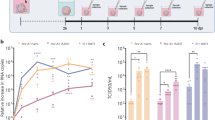Abstract
Measles virus has been suggested to cause subacute sclerosing panencephalitis (SSPE), a slow central nervous system disease of children. However, several questions remain about the pathogenesis of SSPE. For example, it is not known whether alteration of the measles virus genome has a role in the initiation and persistence of the disease. Several studies have compared the RNA and protein composition of wild-type (wt) and SSPE strains of measles virus in a search for markers characteristic of the latter1–4. All the studies used SSPE strains that had reverted to the budding, virion-producing form, similar to wt. We have shown, however, that only cell-associated non-budding strains of SSPE virus cause an SSPE-like persistent infection in young ferrets5. Strong cell association and cell-fusing activity were essential for the virulence of measles virus in the brains of experimental animals and possibly humans. We have, therefore, compared the protein composition of virulent SSPE strains to that of the budding, non-virulent SSPE and wt strains. We report here that the M protein was not detectable in non-budding SSPE strains D.R., Biken and IP-3, and strain D.R. contained very little H protein.
This is a preview of subscription content, access via your institution
Access options
Subscribe to this journal
Receive 51 print issues and online access
$199.00 per year
only $3.90 per issue
Buy this article
- Purchase on Springer Link
- Instant access to full article PDF
Prices may be subject to local taxes which are calculated during checkout
Similar content being viewed by others
References
Hall, W. W. & ter Meulen, V. Nature 264, 474–477 (1976).
Hall, W. W., Kiessling, W. & ter Meulen, V. Nature 272, 460–462 (1978).
Wechsler, S. L. & Fields, B. N. Nature 272, 458–460 (1978).
Schluederberg, A., Chavinich, S., Lipman, N. B. & Carter, C. Biochem. biophys. Res. Commun. 58, 547–551 (1974).
Thormar, H., Mehta, P. D. & Brown, H. R. J. exp. Med. 148, 674–691 (1978).
Graves, M. C., Silver, S. M. & Choppin, P. W. Virology 86, 254–263 (1978).
Hall, W. W., Lamb, R. A. & Choppin, P. W. Proc. natn. Acad. Sci. U.S.A. 76, 2047–2051 (1979).
Wechsler, S. L., Weiner, H. L. & Fields, B. N. J. Immun. 123, 884–889 (1979).
Lin, F. H. J. Virol. 25, 207–214 (1978).
Thormar, H., Jervis, G. A., Karl, S. C. & Brown, H. R. J. infect. Dis. 127, 678–685 (1973).
Lamb, R. A., Etkind, P. R. & Choppin, P. W. Virology 91, 60–78 (1978).
Bonner, W. M. & Laskey, R. A. Eur. J. Biochem. 46, 83–88 (1974).
Author information
Authors and Affiliations
Rights and permissions
About this article
Cite this article
Lin, F., Thormar, H. Absence of M protein in a cell-associated subacute sclerosing panencephalitis virus. Nature 285, 490–492 (1980). https://doi.org/10.1038/285490a0
Received:
Accepted:
Issue Date:
DOI: https://doi.org/10.1038/285490a0
This article is cited by
-
Molecular analysis of structural protein genes of the yamagata-1 strain of defective subacute sclerosing panencephalitis virus. II. Nucleotide sequence of a cDNA corresponding to the P plus M dicistronic mRNA
Virus Genes (1990)
-
Measles virus matrix protein gene expression in a subacute sclerosing panencephalitis patient brain and virus isolate demonstrated by cDNA hybridization and immunocytochemistry
Acta Neuropathologica (1987)
-
Defective translation of measles virus matrix protein in a subacute sclerosing panencephalitis cell line
Nature (1983)
-
Expression of five viral antigens in cells infected with wild-type and SSPE strains of measles virus: Correlation with cytopathic effects and productivity of infections
Archives of Virology (1982)
-
Subacute sclerosing panencephalitis antibodies against measles virus polypeptides
Journal of Neurology (1982)
Comments
By submitting a comment you agree to abide by our Terms and Community Guidelines. If you find something abusive or that does not comply with our terms or guidelines please flag it as inappropriate.



